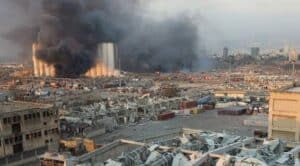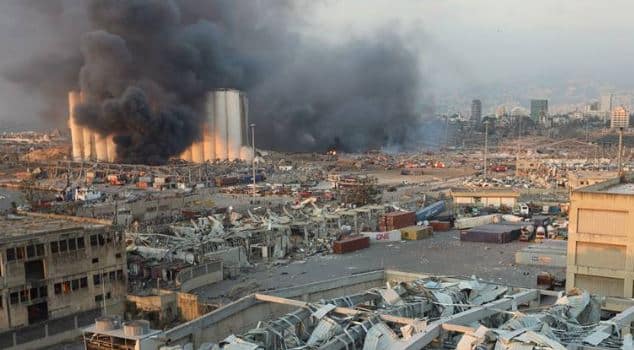A catastrophic explosion rocked Beirut, Lebanon, earlier today, leaving thousands injured and claiming at least ten lives. The cause of the explosion is still under investigation, with reports suggesting possibilities such as a chemical factory fire or the explosion of a ship carrying fireworks. An official statement from the government is awaited.
The Human and Economic Cost of the Explosion
The aftermath of the explosion has overwhelmed Beirut’s hospitals, which were already struggling with a surge in COVID-19 cases—5,000 reported in a single day. The Lebanese Red Cross Society has reported a massive number of casualties, though exact figures are yet to be confirmed.
This disaster adds to Lebanon’s ongoing financial turmoil, exacerbating challenges in a country already grappling with economic crises, high unemployment, and political instability.
The Explosion’s Ripple Effect on Cryptocurrency Markets
While the explosion is expected to deepen Lebanon’s economic challenges, global cryptocurrency markets are unlikely to be affected significantly. Here’s why:
1. Lebanon’s Cryptocurrency Market Size
Lebanon’s crypto adoption remains relatively small compared to global leaders like the United States, China, and South Korea. This limits the direct impact of any localized crisis on global cryptocurrency trends.
2. Global Crypto Market Stability
After a turbulent trading day, Bitcoin and Ethereum prices stabilized on Tuesday, showing resilience to external shocks. Chainlink also demonstrated significant growth, indicating steady investor confidence in the market.
3. Historical Resilience
The cryptocurrency market has historically been immune to localized financial crises. For example, while Lebanon has faced repeated economic downturns, the crypto market has remained largely detached, driven by broader global trends.
Lebanon’s Financial Landscape and Its Challenges
A Service-Based Economy
Lebanon’s economy is heavily reliant on services, with tourism accounting for a significant share of the nation’s GDP. The country imports 80% of its essential goods, including oil, meat, and grain, making it vulnerable to global price fluctuations.
Economic Struggles
Years of financial mismanagement, high public debt, and political instability have plunged Lebanon into one of the worst economic crises in its history. This explosion is expected to worsen an already dire situation, further straining the country’s ability to recover.
FAQs
1. Will the Beirut explosion affect global cryptocurrency prices?
No significant impact is expected as Lebanon’s crypto market size is small compared to global leaders like the U.S. and China.
2. How does Lebanon’s economy rely on imports?
Lebanon imports 80% of its essential goods, including food, oil, and raw materials, making its economy highly vulnerable to external shocks.
3. Could cryptocurrency offer solutions for Lebanon’s financial crisis?
Cryptocurrency adoption could provide alternative financial solutions, especially in times of economic instability. However, widespread adoption is limited due to regulatory and technological barriers.

Conclusion
The tragic Beirut blast has added another layer of complexity to Lebanon’s economic struggles, but its impact on the global cryptocurrency market remains minimal. While the crypto market continues to stabilize, Lebanon faces an uphill battle to recover from its compounded crises, including political instability, financial mismanagement, and now a devastating explosion.
The resilience of the cryptocurrency market offers a stark contrast to Lebanon’s fragile economy, highlighting the global detachment of this burgeoning financial sector.
To learn more about the innovative startups shaping the future of the crypto industry, explore our article on latest news, where we delve into the most promising ventures and their potential to disrupt traditional industries.
Disclaimer: The information provided is not trading advice, Bitcoinworld.co.in holds no liability for any investments made based on the information provided on this page. We strongly recommend independent research and/or consultation with a qualified professional before making any investment decisions.




